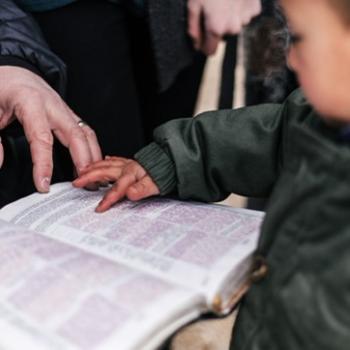In an era in which truth is considered subjective, there is no worse heresy to the world than orthodoxy. The idea that there is a binding standard of truth is bad enough, but saying that it has been and must be passed down through the generations is even more blasphemous to the secular! Sadly, this suspicion of “dogma” has crept into some corners of the church, and statements like “no creed but Christ” and “it’s a relationship, not a religion” are enthusiastically proclaimed.
But when we move past culture and fad statements, it’s clear in Scripture that standing firm in and living out orthodox doctrines of the faith is precisely what God desires for the Church. God has set apart the Church for Himself with objective standards and practices regarding what constitutes faith and what we are to believe concerning Him. After all, orthodoxy is based on His Word alone. But, besides His glory, what does God desire of his people’s orthodoxy? What does he command us to do with it as a Church? Well, God expects us to tell the children.
A Promise To Our Children
When Israel was preparing to cross into the Promised Land after 40 years of exile, God revealed to Israel an orthodox statement about His being and their duty to Him in the Shema in Deut 6:4-5. “Hear, O Israel: The Lord our God, the Lord is one. You shall love the Lord your God with all your heart and with all your soul and with all your might.” These laid out two vital truths to Israel: First, God is one, and there is no other god but Him. Second, His people must love Him and honor Him in every way. That is the greatest commandment (Matthew 22:36-40), and God’s first application of it is “And these words that I command you today shall be on your heart (6:6). This shows us that God desires both orthodoxy and orthopraxy (correct practices of the faith) for His people. God doesn’t want empty-headed but passionate devotion or big-brained-empty-hearted followers. No, He calls for men and women to love Him with all their possible strength and to know Him and make Him known.
Then God gives the second call to His people, “You shall teach them diligently to your children, and shall talk of them when you sit in your house, and when you walk by the way, and when you lie down, and when you rise. You shall bind them as a sign on your hand, and they shall be as frontlets between your eyes. You shall write them on the doorposts of your house and on your gates” (6:7-9). The Shema, the base orthodox statement about God’s nature and our obligations to Him, is followed by a call to tell children about God.
God’s expectation for His people’s orthodoxy is that we inform our children of God and His Gospel. The statement following the Shema gives multiple places we are to do this: As we sit together in our home, we must declare the goodness of God. As we walk through the streets, we must tell them of the glory of God. As we lie down to rest, we remind them of the rest we have in Christ. As we ferry our kids to practice, prepare for school, work on homework, take care of the house and chores, and go about our daily grooves, we must set up our homes and lives as constant flashing reminders of what God has done for us. We must never stop telling our kids about God because the world will never cease attempting to entice them from the truth. The most influential witnesses to Children about God, for better or worse, are their parents. The greatest outward indication of your belief and trust in Christ is intentionally making it a hallmark of your home to pass the truth of the Lord down to your children.
You might be thinking, “Well I don’t have kids, or I can’t have kids, so what about me?” The good news is that the Shema was given in a covenantal setting. It was designated for Israel as they prepared to enter the Promised Land. This principle didn’t end when Christ came. It came to fruition! This means it is the responsibility of all those in the church to pass the faith on to the children therein.
In the PCA Book of Church Order (56-5), there is an optional vow to ask the congregation following infant baptism; “Do you as a congregation undertake the responsibility of assisting the parents in the Christian nurture of this child?” The congregation, while standing, will (hopefully!) answer “we do.” That’s a serious vow, and the best way a church can do that is by teaching, equipping, praying for, and making room for children. There are multiple avenues of ministry for those without children in the church. From being a prayer partner to serving in the nursery you can contribute. Seriously, just ask your pastor, he will gladly tell you ways to serve or point you in the right direction! Find a way to serve because as it says in Psalm 145:4 “One generation shall commend your works to another and shall declare your mighty acts.”
The healthiest churches are wiggly churches. They are the churches full of children in the pews learning about the God of Abraham, Isaac, and Jacob and that he is the very same God to Mom and Dad. Healthy churches teach that the Lord their God is One, and that God’s people are to love Him with all their being. They are churches teaching the generations about the incarnation, the virgin birth, and the life, death, and resurrection of Jesus Christ. They are churches that teach justification by grace alone, through faith alone, in Christ alone. They are churches that bring children the truth of the King.
But If you want to see a dead church, go to a silent church. Visit a church without cooing or shifting feet in the pews. Go to a church where children are nonexistent or utterly excluded from the body. No, a church isn’t automatically healthy just because it has a lot of kids. But a church is certainly unhealthy or dying if there are none.
Three Ways to Share The Truth with Children
So, how do we actually share Christ with our children? Well let me suggest three totally unoriginal ways:
1 – Family Worship. Family worship is taking time out of the day to worship the Lord as a family. I know, groundbreaking definition. But it is that simple of a practice. Family worship consists of at least these three parts: Reading the Bible, praying, and singing together. It can be as simple as reading a chapter of the Bible together. Or with younger children reading from a storybook Bible (I recommend Kevin DeYoung’s for younger kids). Then, sing a hymn or praise song everyone knows. Then, close in prayer. That’s family worship in a nutshell. You can add to it and grow with it as necessary. Don’t let the idea of family worship be daunting. Keep it simple, keep it focused on the Lord and His Word, and you will see Him work!
There’s an old saying in Brazilian Jiu-Jitsu that the most difficult belt to earn is the white belt (the first belt). The reason is that most people never try. I’d argue the same thing about family worship. The hardest thing about family worship is starting it. But I can tell you, family worship has been the highlight of my day for the past 4-years. I can’t recommend it enough.
2 – Public Worship. Bringing your children with you and engaging in public worship is another way to show children the goodness of God. This isn’t an argument for or against children’s church (that would take a series!) but rather just an encouragement to take your children with you to worship as you can. If they are still very young, I encourage you to work towards getting them used to sitting in service. Check them into the nursery after the singing and before the sermon so they’re used to that part of worship. Keep them with you until point number 1, then 2, then 3. Bring special activities they only get on Sundays. And do all of this so they can be part of the corporate worship of God’s saints!
Many kids at our church are covered in stickers and sitting on the floor by the end of worship. They may not grasp the fully formed sermon points, and they may not understand the sacraments. But they do understand that mom, dad, and everyone around them takes this very seriously. And that’s an important foundation.
3 – Catechizing Children. To Catechize simply means to instruct. We are called to instruct our children in the elementary things of the faith (as seen above in the Shema). On top of Bible memory and reading, one great way to do this is through Catechisms. These question-and-answer teaching tools overview key aspects of the Christian faith. There are many Reformed versions out there, and for children, I recommend the Westminster Shorter Catechism (the gold standard in my opinion), or the Children’s Catechism (a helpful abbreviation of the WSC).
Joel Beeke gives a good argument for using this tool. He says that catechisms “provide clear, concise definitions of basic doctrines and keywords in easily memorized form so our children can hide them in their hearts. Bible references (“proof texts”) anchor these definitions in Scripture. The catechisms not only teach basic Christian doctrine but also show us how to live according to God’s law and how to pray. When we catechize our children, they learn the basic truths of Christian faith and living, and we reinforce and deepen our knowledge of them” (1).
Whatever you take away from this article, let it be this. Tell your children, and the children in your church about Jesus. They need to know what He has done.
1 – https://www.ligonier.org/learn/articles/blessing-catechizing-our-children
This was a guest post from David Chambers. David has been serving youth and families in the context of his local church for over 10 years. He is a proud husband to his wife Brittany and a proud father to his sons AJ and Jackson. David is a student at Reformed Theological Seminary, where he pursuing a Master of Divinity in hopes of pursuing ordination in the Presbyterian Church in America (PCA).












